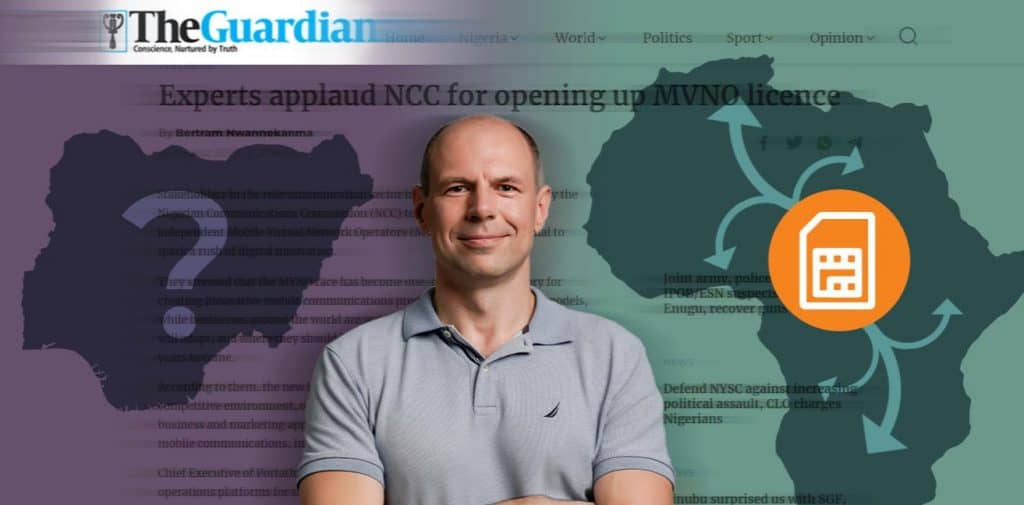It’s only been one year since the government of Nigeria announced that it would grant licenses for independent Mobile Virtual Network Operators (MVNOs) in the country, thus opening up a historically gated market to free competition. Yet, already, the positive outcomes are becoming evident. After an initial estimate of 25 new MVNO licenses, the Nigerian Communications Commission (NCC) has already issued 31. That’s 31 brand-new telecommunication companies offering new choices and products to the Nigerian market. And this is likely just the start.
This sudden and significant wave of competition has the potential to transform the landscape of the Nigerian telecom services market. It holds the triple promise of intensifying competition, fostering innovation, and delivering elevated services for consumers. It’s like a focused market experiment – and, for smart MVNO innovators, a highly exciting opportunity. And there is still ample opportunity to participate.
For the business and tech community in Nigeria, this experiment is sure to be a fascinating testing ground for telecommunications market innovation and consumer preferences. And the whole world is going to be watching. So, we’re taking this opportunity for a deep dive into intricate details of this pivotal legislative development. And also into its far-reaching implications – not just for the Nigerian telecommunications industry, but for the global industry as a whole. Read on to get the whole story!
Meet the Mobile Virtual Network Operator (MVNO)
To comprehend the significance of this decision, it’s crucial to understand exactly what a Mobile Virtual Network Operator (MVNO) is. It is also important to understand what distinctive role this business model plays within the larger telecommunications landscape.
Imagine the typical large telecom your average consumer is likely familiar with. You’ll have national or international service, big data centers, large investments in physical radio network infrastructure (antenna towers, each connected to a base station; backbone network cables connecting each base station to the “core” equipment in datacenters, plus routers, switches, and so on…). This is the Mobile Network Operator company, or MNO. And in many countries (like Nigeria, up until now) a handful of these will dominate the telecommunications market.
The Bigs and the Smalls
In contrast, MVNOs lack their own physical network infrastructure. Instead, they will form a partnership with one of those established MNOs, leasing capacity on their network to deliver their services. For the MVNO, this collaborative approach means they don’t need that heavy, risky, upfront infrastructure investment. That’s why the MVNO trend is on the upswing.
What this means for the MNO is that they can collect secondary revenue from smaller companies that are more agile and faster-moving. So, they are now able to provide service plans that are more customized and innovative. Plus, they are able to take bigger risks on new, value-added offerings or niche market segments. (If this sounds like the kind of symbiotic cross-species partnership you might see on a show like Animal Kingdom or BBC Earth, you’re not far off.)

The Impact of MVNO Licenses on Nigeria’s Telecommunication Sector
MVNOs might be a big market force right now – especially in Africa – but they are far from new. In fact, MVNOs have played a substantial role in the global telecommunications sector for decades: the original pioneer, Virgin Mobile, launched in the UK in 1999. But this fresh licensing framework in Nigeria is new, and it is forging a distinct competitive environment. It’s almost like a closed laboratory.
As it happens, this unique testing environment will be a powerful tool for industry analysts who are looking to better evaluate different business and marketing strategies in today’s fast-changing mobile communications landscape. (Think: IoT, AI, automation – all of those hugely powerful, market-shifting forces that are suddenly everywhere, all at once.) Here we have this bordered market (the complete citizenry of a nation), and aaaalll these new entrants (those 31 new MVNOs we mentioned). That’s a lot of brand-new consumer choice! What will those consumers do? Which products and services will win? What new innovations and pricing models will the market ask for? The industry can’t wait to find out.
Reverberations Beyond Telecom
And it’s not just the telecom industry that’s excited about this shift. In an interview with The Guardian, a Nigerian media outlet, Satya Mekala, managing director at Brussels-based Wireless Technology Labs (WTL), described a huge opportunity for businesses of all kinds to scale up their operations in Nigeria. Before now, he explained, the connectivity foundation just hasn’t been reliable or extensive enough.
“Access to affordable, reliable infrastructure has been a challenge for both businesses and consumers in the African market,” he said. “The rural telecom licenses that the NCC has given MVNOs from tier 3 and above will drive investments to connect the parts of the country that are not yet connective. This will certainly be beneficial to the MNOs and MVNOs, but also to these local communities.”
But Can an MVNO in Nigeria Really Challenge the Big Telcos?
Suddenly having six times (!) the number of businesses operating within one sector within one country – all vying to carve out their own successful niche in product offering, business model, marketing strategy, competitive approach, technology platform – is unprecedented in Africa. And it’s naturally going to deliver some unique and pressing challenges.
Well, you know what they say about challenge. If it’s on one side of a coin, on the other side is always opportunity. Here are four specific forces that promise to deliver both sides of that kobo coin:
Heightened Competition
By ushering in MVNOs, the NCC is igniting a new era of competition within the telecommunications sector. The presence of additional players is going to compel the incumbent MNOs to elevate their services and adapt to the evolving demands of their market.
MVNO Market Penetration
MVNOs tend to target niche markets, demographics, and segments that traditional MNOs might overlook. That’s good news for consumers in those previously underserved niche markets, who can likely look forward to improved connectivity and bespoke services.
Catalyst for Innovation
That same agility that allows MVNOs to target niche markets also allows them to capitalize on (and sometimes drive) emerging trends and innovations. As new MVNOs enter the Nigerian market, their dynamic approach might just catalyze fresh, inventive products and service packages. (A force that, we might add, could help drive forward the entire global industry.)
Enhanced Consumer Choice
New MVNO networks open new options for consumers to explore. With a broader range of plans and services to choose from, each individual consumer has more opportunity to align their selections with their own unique needs.
“Certainly, MVNOs will drive the costs of communications services down and drive local economies to improve,” Satya Mekala told us in a direct conversation about the new MVNO licenses in Nigeria. “MVNOs will be more innovative, proposing value added services that will stimulate the consumption of telecom services that benefit the end user.”
The Trick: MVNO in Nigeria Licence Details
We mentioned earlier that this new MVNO framework that the NCC is introducing is tiered. To be specific, it involves five tiers. Complicated, yes. But it also grants entrant MVNOs the flexibility to select the level of control and capabilities in which they want to operate, and the degree to which they want to collaborate with other operators. (Not to mention the level of licensing fee they want to pay.)

So what are the five tiers in the new Nigerian telecom framework? Here’s the full MVNO list of tiers:
1: Services Virtual Operator (SVO)
- Can provide services to customers without owning network infrastructure
- Host operator (MNO) provides wholesale capacity, influencing the pricing that the MVNO can offer
- Can operate a Short Message Service Centre (SMSC)
- Has control over branding, sales, distribution, and customer relations
- Limited tariff control
2: Simple Facilities Virtual Operator (SFVO)
- Has more control over their value chain than Tier 1 MVNOs
- Can set up an intelligent network, but lacks core switching and interconnect abilities
- Can own more components, such as Home Location Register (HLR), SIM issuance, etc.
- Shares revenue with host operator (MNO) for inbound calls
- Has greater pricing and tariff control that Tier 1 MVNOs
3: Core Facilities Virtual Operator (CFVO)
- Can launch a full core network with interconnect and switching capabilities
- Relies on host operator (MNO) for radio access, but has full tariff control
- Subsidized requirements encourage service delivery to underserved areas
4: Virtual Aggregator/Enabler
- Acts as an intermediary between MNOs and other MVNOs
- Aggregates network services and resells to other MVNOs
- Can focus on either aggregation or enabling
- Can act as a CFVO in underserved areas
5: Unified Virtual Operator (UVO)
- Has the option to choose their tier and offer services accordingly
- Can form agreements for direct service provision in underserved areas
As you can see, the higher tiers grant MVNOs greater authority in using MNO infrastructure and promoting their services. The approach dictates an organic development of the MVNO network in Nigeria.
The fees for these MVNO licenses vary, starting from 35 million naira (about US$76,000) at Tier 1 and reaching 500 million naira (about US$1.08 million) for Tier 5.
Want all the details on this new Nigerian telecom licensing framework? You can find it in the official documentation provided by the NCC. Also: do the descriptions of these tiers have you thinking for the first time about launching your own MVNO? Check out the video below to get started.
What Is the Potential Impact of the NCC Framework on the Nigerian Telecom Sector?
The dawn of the MVNO age in Nigeria is poised to drive a multitude of positive changes across the telecommunications sector. These will be seen both within Nigeria itself, and as they ripple out through the global industry. Here are just a few we think you can expect:
Elevated Service Standards
As these new MVNOs become driven by the imperative to differentiate themselves, they will repeatedly invest in providing a better customer experience. That will raise the bar for all consumers. Anticipate accelerated data speeds, augmented coverage, and an overall heightened quality of service.
Affordable Service Plans
The services that MVNOs provide are often oriented toward price-sensitive market segments. As they compete to win customers, they are likely to introduce even more accessible service plans. This shift could usher in greater affordability for the consumers who need it most.
Innovative Charging Models
Another product of increased competition could be a rapid evolution of charging models. Think: pay-as-you-go plans, data rollovers, the bundling of content subscriptions, and so on. Each MVNO will test out its own models to see what wins customer loyalty in their niche.
Customized Service for Niche Markets
One of the most promising impacts of the MVNO boom in Nigeria, and throughout the world, could be the delivery of custom-designed services and products for niche markets that have historically been ignored or at best underserved by the big MNOs. Smaller telcos, naturally, are far more nimble. That allows them to reach far smaller markets (both in terms of localized or distinct residential/consumer markets and small business markets who need more and better communication, marketing, call center, and e-commerce tools).
Socioeconomic Implications
Naturally, the launch of new telecommunications businesses will bring new jobs, customer service and marketing to technical support. But it could have wider implications than that. Consider the previous point: that improved connectivity to remote regions could improve access to education, training, and resources; boosts for rural businesses; and increased employment opportunities across all sectors, not just telecom.
So, Where Is the Best Path to Success for an MVNO in Nigeria, and Across Africa?
Remember that Guardian article? It just so happens they also asked us this very same question. Our PortaOne CEO, Andriy Zhylenko, responded that successful service providers are the ones that make sure their product is more than a commodity.

“It’s very easy to swap your current SIM card for a new one if you see a cheaper rate, but it’s a lot less easy if that would lose you access to a bunch of free streaming services, or to a micro-loans service, or if you have integrated their ‘Internet of Things’ connectivity into your home,” he told the Nigerian media outlet. In other words: be sticky. Integrate services and benefits that make it much harder for customers to decide to drop you for a lower-priced competitor.
That’s some good foundational advice. But we expect the evolving Nigerian telecom market is going to be delivering a lot more key lessons in how to be competitive. So much so that every agile telecom in the globe should be watching this experiment. In particular, Andriy points to four key trends that smart MVNO businesses should be keeping an eye on:
Agile Backend Systems
The companies that win are likely to be the ones that establish adaptable backend systems. Particularly, ones that they control themselves. That will enable low operating costs and the swift deployment of new services.
Customer Journey Integration
Like all customers across the world today, the Nigerian market is likely to be won over by an excellent, problem-free customer journey. Once a customer gets a taste of effortless online sign-up, seamless data sharing, and personalized product configuration, they’re going to promote that business to everyone they know. A satisfied customer is a far more effective growth driver than any traditional billboard or bus stop ad.
Embracing the Latest Technologies
MVNO SIM is just the beginning. If you want to stay competitive, you can’t ignore eSIM for streamlined customer onboarding, AI for customer support and process optimization, and innovative analytics for churn prevention. MVNOs that incorporate cutting-edge technologies like these are the ones you’ll see leading the race. And you need MVNO billing software and other platforms that can adapt to these technologies
Value-Added Offerings
This is that “stickiness” we talked about. If you’re only competing on price, you’re just participating in a race to the bottom. The MVNOs that excel in Nigeria are likely to be the ones that go beyond offering basic services to win customer loyalty. Smart partnerships will take that edge even further, allowing for bundled additional offerings like video streaming, micro-loans, or Internet of Things services.
Yes, It’s Exciting… But the Journey Won’t Be Easy for Any MVNO Type
While the advent of MVNOs heralds a transformative period for Nigeria’s telecom sector, these newly born companies still have several challenges to navigate. Here are just a few:
Intense Competition
This is a unique situation in terms of the competitive landscape in Nigeria. Multiple MVNOs are launching simultaneously and then racing against each other to secure market share. As with any race, there will be winners and losers. On the positive side, this “great Nigerian MVNO race” is poised to drive innovation and spark new product concepts across the industry. That’s going to be a nice change from the status quo, in which a few big incumbents block competition and form a barrier against innovation.
Differentiation
Identifying untapped markets and specific customer groups is going to be key. For instance, if you want to cater successfully to small businesses, you need to envision new services they don’t even realize they need yet. Mini cloud contact centers, eSIM-powered virtual office telephony systems – revolutionary new business tools are being invented all the time in today’s telecom market. On the consumer side, experimentation is crucial for transforming products from an easily swapped commodity into something indispensable. Maybe that’s integrating unique features such as micro-loan services or free streaming entertainment. Maybe it’s digital priority event passes. Likely, it’s something no one has thought of yet. Generating novel ideas like these from scratch can be a daunting task.
Navigating Network Sharing Agreements
MVNOs hinge on partnerships with established MNOs for access to network infrastructure. The success of a given MVNO in South Africa is going to rely heavily on its ability to secure favorable network sharing agreements (that ensure reliable connectivity, too).
Investment in Infrastructure
Although MVNOs can bypass the need for physical network infrastructure, they still need to invest in IT systems, customer support, and great marketing. If they don’t, you can be sure that their competitors will.
The Greatest Competitive Edge of All: A Good Partner
Are we talking about us? Of course we are. The last and most critical success factor an MVNO needs to consider is its technical partnerships, and the 31 (and counting) new MVNOs in Nigeria are no exception. As it happens, we recently released a free MVNO checklist that’s specifically tailored for aspiring entrepreneurs venturing into this booming part of the industry. It includes tips for your initial feasibility assessment, questions you need to ask your infrastructure-providing MNO, and all the essential considerations you need to kickstart your launch process.

Take these tips and run with them. When you’re ready to consider your technology solutions, come chat with us about our adaptable, open-source platforms, API-based workflow integrations, and our Add-on Mart of easy to use low- and no-code telco tools to help you instantly expand your product offerings. PortaOne is all about agile launches and taking your minimum viable product (MVP) to market fast, so your paying customers can tell you how to perfect it. And when you need new features? Our seven-week update cycle will bring them to you quickly.
While challenges undoubtedly lie ahead for the new MVNOs in Nigeria, the potential benefits for consumers and the telecommunications sector are momentous. Nigeria’s telecom landscape is at a crossroads, and the journey ahead promises to be one of unprecedented growth and evolution.
We’re super excited to see what comes next. Meanwhile, want to talk about your own MVNO evolution? Get in touch with our team today and let’s find out what we can do together.

